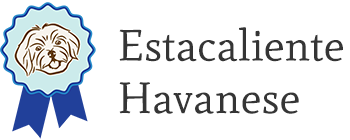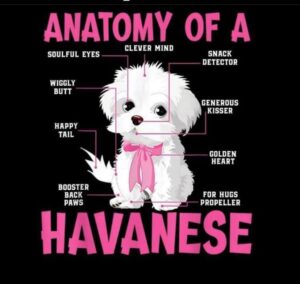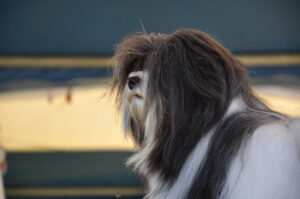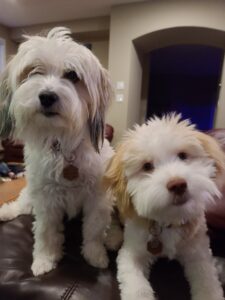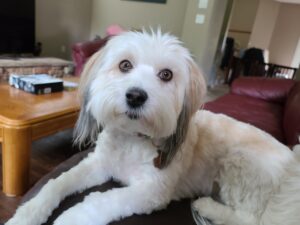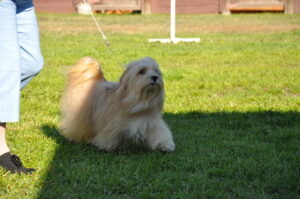Havanese Breed Information
The following was copied uncredited from a Facebook post that sums up the Havanese Breed nicely:
HAVA – WHAT? HAVANESE!
Is that some kind of new designer dog? – No.
Havanese is the only official and native dog of Cuba.
Havanese are named after the Capital of Cuba – Havana.
Havanese weight is generally 9 – 15 lbs and up to 11.5″ at the shoulder.
Havanese are hypoallergenic meaning three things:
- Many people who have dog allergies can manage Havanese.
- Havanese have hair versus fur.
- Havanese do not shed.
- Havanese make excellent Emotional Support dogs and have been inducted into the British Hearing Ear program to serve the hearing impaired.
- Havanese live about 14 years, although, many live longer lives. The oldest Havanese so far lived to be 18 years and 2 months.
- Havanese were shown in the second year of t he first established dog show in England in 1863.
- Havanese have more than 28 nicknames.
- Havanese are found on many official postage stamps around the world.
- Havanese have been recognized by AKC since 1996 and CKC since 1999 in the Toy Group.
History of the Havanese Breed
From Wikipedia: “The Havanese, a bichon-type dog, is the national dog of Cuba, developed from the now extinct Blanquito de la Habana (“little white dog of Havana”). The Blanquito descended from the also now-extinct Bichon Tenerife. It is believed that the Blanquito was eventually cross-bred with other bichon types, including the poodle, to create what is now known as the Havanese. Sometimes referred to as “Havana Silk Dogs”, this was originally another name for the Blanquito de la Habana.
The Havanese is small in size and sturdy in structure with a tail carried over its back and ears that drop and fold. The coat is abundant, long, and silky, and comes in all colours. The Havanese has a spirited personality and a curious disposition, and is notable for its springy gait, a characteristic that distinguishes the breed from all others. The Havanese is considered an ideal family pet and a true companion dog. They are highly adaptable to almost any environment. Because of their strong social needs, Havanese will not thrive in a environment where they are isolated for several hours each day.”
Havanese Traits
- Life Expectancy: 14 – 16 years
- Height Range: 8 – 11.5 inches (breed standard for showing – can be taller for companion dogs)
- Weight Range: 7 – 13 lbs (breed standard for showing – can go up to 25 lbs for companion dogs)
- Trainability: Easy to train; very eager to learn
- Climate: Tolerates heat and cold well. Double coated to insulate and keep cool in the summer and warm in the winter.
- Exercise: Indoor dog; below average exercise required.
- Temperament: Excellent with children; Good with other animals.
- Colours: White, cream, gold, silver, black, chocolate, red, and many more. Blue is the only colour not acceptable for show.
- Grooming: Regular brushing; for show, should have natural (non-clipped coat). Many people not showing will keep their dogs in a “puppy-cut”.
Variations in Appearance
Although there are a few arguments on whether the original Havanese were all white or of different colours, modern Havanese are acceptable in all coat colours and patterns. All coloured dogs should have a black nose and black pigment around the eyes, with the exception of chocolate (brown) dogs, which may have dark brown pigment on their nose instead. Examples of coat colours are white, cream, fawn, red, chocolate brown, beige, gold, silver, blue, and black. The coat may be one solid colour or have markings in one or more other colours. For example, sable, brindle, black & tan, tri-colour, irish pied, parti-coloured, belton, or piebald, black and white, beige black, and white.
Characteristics of a Havanese
The Havanese becomes very attached and are very loyal to their owners, often attaching to one person especially whom they will closely follow. The Havanese is not suited to be alone all day. Although the Havanese is an active and lively dog, it is small enough that much of its exercise needs can be met in a house or yard, and it therefore does not require as much vigorous exercise as other breeds. However, exercise is still necessary for this breed to be happy and healthy.
Grooming Your Havanese
Among new and not so new Havanese owners, “Grooming” is one of the most common topics for questions. The profuse coat needs to be thoroughly combed at least twice per week. A Havanese with a dense or curly coat will be more prone to tangling and matting, thus requiring more frequent combing, than one with a silky, slightly wavy coat. If not showing the dog, it can be trimmed shorter to require less brushing. Many owners clip their dogs into a 1-2 inch long “puppy cut” for ease of maintenance.
Sport and Show Dogs
The breed standard notes that except for slight trimming around the feet to allow for a tidy foot, they are to be shown untrimmed; any further trimming, back-combing, or other fussing is against type and will not be allowed. Occasionally, I will have a home placement opportunity for a show quality dog/puppy. Please contact me via the contact me page for more information.
Interested in Owning a Havanese of Your Own?
Whether you would like a Havanese for a show, your own personal companion, or just an all round great family pet, Havanese dogs are one of the friendliest dogs with big personalities and caring hearts. Please contact me directly to discuss how we can meet your needs!
